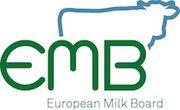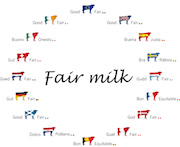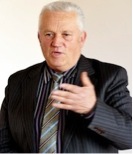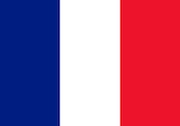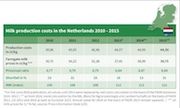The milk market crisis continues to cause dairy farms huge cash flow problems. Another aid package must therefore be adopted and implemented immediately on an EU level. Many farms are no longer able to meet their financial obligations.
In this situation, procuring extra liquidity is not the only priority. To improve the situation in the milk market quickly, the continuing supply pressure must be urgently reduced on the EU level – regardless of the current stagnation in the volume of milk supplied in the EU. This would enable the quantities of skimmed milk powder fed into intervention to be reduced markedly or possibly even to zero.
The EU must also act jointly in the agricultural sector again. Crises in the dairy sector can only be overcome by joint action. That is why the dairy farmers of Europe demand that the EU Council of Ministers for Agriculture adopt the following measures on 18 July:
1. EU acts in unison – voluntary restraint on supply in every country
The milk producers must be offered a time-limited voluntary restraint on supply with the same terms and conditions on a binding basis throughout the EU. It is to be co-ordinated by the EU Commission and financed by funds provided by the EU and each member state. Only in this way can a reduction in volumes have enough impact on prices. The reduction should be between 5 and 25 percent of the participating famers’ individual farm volume. The subsidies should be paid solely to farmers who want or have to carry on running their farms.
If some countries can evade this obligation to offer the voluntary restraint on supply and maintain or even increase their production level in the defined crisis period, it no longer makes any sense for the other countries to cut their volume. Although they would be showing responsibility for stabilising prices, the effect of their measures would be both exploited and diminished by the non-participating countries. That is why the voluntary restraint on supply must be offered to the dairy farmers in every country.
2. Offer a clear incentive, to appeal to enough milk producers and prevent their being disadvantaged vis-à-vis non-reducing producers
To achieve a rapid effect in the market, a clear incentive has to be given for farmers to cut milk supply for a limited period. What is crucial is the level of the compensation payment, which has to be the basis for calculating the subsidy. From the milk producers’ viewpoint it should be above the current milk price level. This would not only accelerate the producers’ decision in favour of it – besides the appropriate effect on the market, the farms would gain extra liquidity. What also has to be considered is that the market will recover during the period in which the dairy farmers reduce their volumes. The participating farms could not benefit from this to the same extent as farms carrying on regardless. Any disadvantage for farms cutting supply must be prevented by the corresponding level of the compensation payment.
Given the necessity of implementing the restraint on delivery rapidly and as simply as possible, EMB recommends fixing the bonus across the board at 30 cents per kilo of milk not supplied. A 3% cut in milk supply for 12 months would therefore require funding on an EU level of € 1.35 billion. Moreover, this sum was paid by the producers in the form of a super-levy in the last two years of the quota system. So this money would be re-injected in the sector, there would be no additional financial burden for EU citizens. If the measure were limited to a period of six months, it is calculated that 6% of the milk volume could be reduced for that period. In view of the current EU market prices, a compensation payment of 30 cents is not only an attractive incentive in most member states, it also provides the requisite scope for a positive market development.
The funds are to be disbursed monthly to the milk producers in relation to the volume reduction. The final settlement can be made in the last month of the measure.
The concrete amount of the compensation payment must be stipulated clearly and unambiguously before applications are made. Any subsequent stipulation, derived for instance from the total volume of applications or the market development of the following weeks and months, results in uncertainty and longer decision-making processes on the farms.
The requisite funding volume could initially be allocated according to the milk production in the respective member states. If a member state is unable to use its funding volume within a time limit to be specified, the unused volume will be made available to the other member states.
The individual producers’ willingness to reduce should be ascertained by a tendering procedure. In this process, producers willing to reduce will undertake to cut their production in the defined period by the quantity bid by them. In this way there will be clarity in next to no time about the extent of the reduction in volume in the EU.
A key aspect in the implementation of the measure is that solely the dairy farmers must make the decision whether the milk supply can and should be reduced for a limited period to enable further subsidies to be claimed. Under no circumstance should the dairies be able to influence this decision.
Substantiation: The liquidity problems on dairy farms are totally unconnected with the differing interests of the dairies. On the contrary, they are the expression of unilateral risk distribution at the expense of the milk producers. Making access for dairy farmers to subsidies dependent on the benevolence/interests of the dairies would not only run counter to the principle of equality, it would further thwart the swift procurement of extra liquidity.
Moreover, it is not expedient to link the granting of subsidies with the involvement of the dairies or their increasing the funds. This would produce a redistribution effect within the dairies. The farm-gate milk price, which is already far too low anyway, would plummet further to finance the bonus. This would result in tangible tension and massive resistance on the committees of the dairies, which is rightly to be feared.
3. Parallel to the voluntary reduction in volumes, apply a temporary cap for other producers
At the same time, in the defined crisis period the milk supplied by producers not participating in the reduction of volumes must be capped for a limited period. This means that they are not permitted to increase their production in this period. Compliance with this restriction would be ensured by an overproduction levy that farmers increasing their volume would have to pay. This would be effective in preventing voluntary cuts in volumes being offset by the increased volumes of others.
To sum up:
- Extra liquidity is to be created immediately by a further EU aid package.
- The entitlement to subsidies is to be linked to a time-limited cut in volumes.
- EU acts in unison – voluntary restraint on supply must be offered to milk producers in every EU country.
- The amount of the compensation payment is crucial for the intended market impact.
- The amount of the compensation payment must also consider the intended recovery in farm-gate milk prices in the commitment period.
- The milk supply must be reduced accordingly from the very first month of the commitment period.
- The compensation payment/liquidity aid is paid directly to the applicants.
- There should be no obligation for the dairies to be involved.
- In the defined crisis period the milk supplied by producers not participating in the reduction of volumes must be capped for a limited period.

